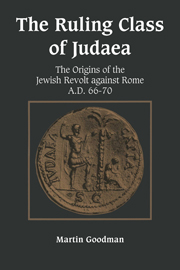Book contents
- Frontmatter
- Contents
- Abbreviations
- Preface
- Maps
- 1 Introduction
- PART I THE RULING CLASS A.D. 6–66
- 2 The new ruling class a.d. 6
- 3 Problems facing the ruling class: economic and social
- 4 Problems facing the ruling class: religious ideology
- 5 Why the ruling class failed
- PART II FACTION STRUGGLE WITHIN THE RULING CLASS
- PART III THE AFTERMATH OF THE REVOLT
- Select bibliography
- Index
5 - Why the ruling class failed
Published online by Cambridge University Press: 01 June 2011
- Frontmatter
- Contents
- Abbreviations
- Preface
- Maps
- 1 Introduction
- PART I THE RULING CLASS A.D. 6–66
- 2 The new ruling class a.d. 6
- 3 Problems facing the ruling class: economic and social
- 4 Problems facing the ruling class: religious ideology
- 5 Why the ruling class failed
- PART II FACTION STRUGGLE WITHIN THE RULING CLASS
- PART III THE AFTERMATH OF THE REVOLT
- Select bibliography
- Index
Summary
The problems faced by the government of Judaea before a.d. 66 were, as has been seen, considerable. A disintegrating society had been thrown into turmoil by growing economic disparities, while native ideology encouraged Jews to blame the Roman aliens for their plight. It was imperative that Jewish leaders should guide their people safely into calm cooperation with Rome if catastrophe was to be avoided. But in fact, as has been shown (above, pp. 40–6), the Jewish ruling class lacked the confidence of the Jewish nation which might have enabled them to carry out such a task. The reasons for this lack of trust and natural authority will be the subject of this chapter. It has already been noted that the men treated as rulers by Rome after a.d. 6 did not in the first place come to power with any status in Jewish eyes inherited from their role in previous regimes (above, pp. 38–40), but the Romans may have expected that occupancy of the leading positions within national institutions by such men, and their ownership of great landed estates, would in time give them the local prestige they so lacked at the beginning. Precisely such a transformation had, after all, taken place within the Roman ruling class itself under Augustus. There were special Jewish reasons why this Roman expectation was to be dashed in Judaea.
- Type
- Chapter
- Information
- The Ruling Class of JudaeaThe Origins of the Jewish Revolt against Rome, A.D. 66–70, pp. 109 - 134Publisher: Cambridge University PressPrint publication year: 1987



